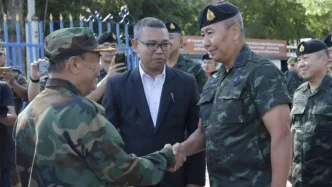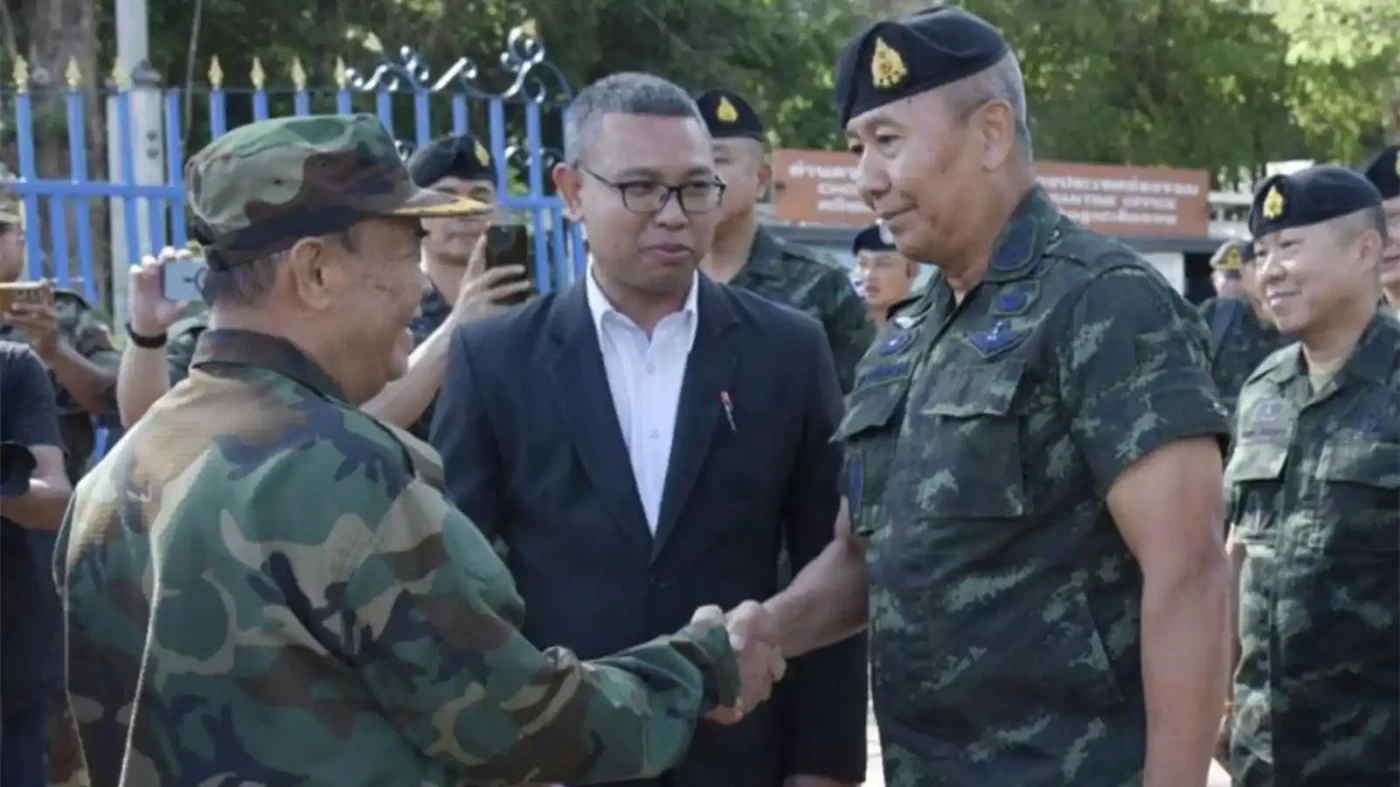As tensions simmer along the Cambodian-Thai border, Cambodia has signaled a firm intent to escalate long-standing territorial disputes to the International Court of Justice (ICJ) in The Hague. With a critical Joint Boundary Commission (JBC) meeting scheduled for June 14, 2025, in Phnom Penh, the disagreement over four key areas—Ta Moan Thom, Ta Moan Toch, Ta Krabei temples, and the Mum Bei region—threatens to strain diplomatic relations further between the two neighbors. While Cambodia pushes for international arbitration, Thailand remains steadfast in its preference for bilateral negotiations, setting the stage for a contentious dialogue.
Cambodia’s Push for International Arbitration
Cambodia’s resolve to seek a legal resolution through the ICJ has become increasingly clear in recent weeks. Prime Minister Hun Manet, during a meeting with French President Emmanuel Macron on June 10 at the Third United Nations Ocean Conference in Nice, France, reiterated his country’s commitment to addressing the disputes on an international stage. A dedicated committee has already been established to prepare Cambodia’s case, focusing on the four disputed border zones.
Tan Jean-François, Minister Delegate for Foreign Affairs, emphasized the urgency of a permanent resolution. “Cambodia is absolutely clear about taking the issues of Ta Moan Thom, Ta Moan Toch, Ta Krabei temples, and the Mum Bei area to the ICJ. This is an undeniable fact, already decided and currently in progress. The goal is to find a peaceful, swift, and permanent resolution to the border disputes in these areas” he stated on June 12. He added that unresolved issues risk sparking renewed armed conflict, a concern rooted in the region’s history of violent clashes over territorial claims.
Cambodia’s stance is not entirely confrontational. Outside the four contentious areas, the government has expressed willingness to continue bilateral cooperation with Thailand on border demarcation and surveys. During the discussion with Macron, the French president offered potential assistance, including the provision of historical maps, to aid in mediation if requested by both parties. Conversely, Thai MP Rangsiman Rome has urged Bangkok to engage directly with nations like Vietnam and France to counter Cambodia’s narrative, accusing Phnom Penh of portraying Thailand as the aggressor in incidents like the May 28 border clash
Thailand’s Resistance to ICJ Involvement
In contrast, Thailand has firmly rejected the idea of ICJ jurisdiction over the disputes. At a press conference on June 11, Thai Foreign Minister Maris Sangiampongsa outlined three key priorities for the upcoming JBC meeting: de-escalating military presence along the border, ensuring clarity in negotiations, and maintaining that Thailand will not accept international arbitration for these issues. The Thai delegation, led by former ambassador to Cambodia Prasas Prasavinitchai, is expected to push for dialogue within existing bilateral frameworks. Thai MP Rangsiman Rome has also proposed cutting electricity and internet supplies to Cambodian border zones to disrupt illegal networks and bolster Thailand’s leverage ahead of the June 14 talks, signaling an escalation in economic pressure tactics.
Thailand’s reluctance to involve the ICJ is seen by some as a strategic move to avoid potential embarrassment on the international stage. Historical precedent looms large—Cambodia secured a landmark victory in 1962 when the ICJ ruled in its favor over the Preah Vihear Temple, a decision reaffirmed in 2013 despite Thailand’s initial objections. That ruling caused significant diplomatic friction and domestic backlash in Thailand, a memory that likely informs the current government’s approach.
Yang Peou, secretary-general of the Royal Academy of Cambodia, pointed out the broader implications of Thailand’s position. “The ICJ operates under the UN Charter, which both Thailand and Cambodia, as UN members, are obliged to respect. Rejecting the ICJ’s jurisdiction equates to disregarding UN laws” he noted. Peou warned that failure to reach an agreement at the June 14 meeting could lead Thailand to escalate tensions, whether through heightened military activity or other pressure tactics along the border.
Domestic Perspectives and Risks of Escalation
Within Cambodia, opinions on the dispute reflect a mix of legal pragmatism and national pride. Ou Chanrath, founder of the Cambodia Reform Party, argued that Thailand’s insistence on bilateral talks is a tactic to avoid the legal disadvantage it faces at the ICJ. “This territory belongs to Cambodia, and Thailand has encroached upon it. Legally, Thailand is already at a disadvantage. If Cambodia files a case with the ICJ, whether Thailand agrees or not is their matter. If they participate and lose to Cambodia, they will be humiliated, so their refusal is a face-saving strategy” he said.
Chanrath cautioned that bilateral negotiations might allow Thailand to leverage political or economic influence to sway outcomes in its favor. He urged Cambodia to remain resolute, even suggesting that force might be necessary to protect national integrity if peaceful resolutions fail. “I don’t support war, but if it’s unavoidable, force must be used because it concerns national integrity” he added, reflecting a sentiment shared by some hardliners who view the border as a non-negotiable symbol of sovereignty.
The potential for armed conflict is not mere rhetoric. The border region, particularly around ancient Khmer temples like Prasat Ta Muen Thom (known as Prasat Ta Moan Thom in Khmer) in Oddar Meanchey province, has seen sporadic violence in the past. A Thai soldier was photographed standing guard at the disputed site as recently as March 26, 2025, a visual reminder of the military presence that underscores these territorial claims. In Thailand, fears of escalation are palpable, with communities in Surin reportedly preparing bunkers, as noted by MP Rangsiman Rome, highlighting the dispute’s impact on civilians.
Historical Context and International Implications
The current dispute cannot be divorced from the broader history of Cambodian-Thai relations, marked by centuries of territorial contention over areas once part of the Khmer Empire. The Preah Vihear Temple case remains a touchstone for Cambodia, not only as a legal victory but as a symbol of national resilience. For Thailand, it represents a cautionary tale of international rulings that can inflame domestic sentiment and complicate foreign policy.
If Cambodia proceeds with its ICJ complaint, the ramifications could extend beyond bilateral ties. As Peou noted, a ruling in Cambodia’s favor would place moral and diplomatic pressure on Thailand under international law. The UN Security Council could also intervene to enforce compliance, compelling Thailand to respect the decision to maintain global order. Such an outcome might damage Thailand’s international reputation, particularly if it is perceived as defiant of UN principles.
Conversely, Thailand’s push for bilateral resolution aligns with its broader foreign policy of managing regional disputes through dialogue rather than external arbitration. This approach allows for greater control over outcomes but risks prolonging unresolved issues, potentially fueling nationalist sentiments on both sides. The presence of military forces near disputed temples like Ta Moan Thom only heightens the stakes, as any misstep could ignite a confrontation neither side claims to want.
Looking Ahead to the JBC Meeting
As the June 14 JBC meeting approaches, led by Cambodia’s Lam Chea, Minister in charge of the State Secretariat of Border Affairs, and Thailand’s Prasas Prasavinitchai, both nations face a critical juncture. Cambodia’s dual strategy—pursuing international legal recourse while maintaining bilateral cooperation on other border issues—suggests a willingness to balance assertiveness with diplomacy. Thailand, however, appears dug in, prioritizing sovereignty over its negotiation process.
The outcome of Saturday’s talks could set the tone for months, if not years, of relations between Phnom Penh and Bangkok. A failure to de-escalate tensions may see Cambodia accelerate its ICJ filing, while Thailand could respond with increased border patrols or economic leverage, given Cambodia’s reliance on Thai infrastructure for electricity and internet supplies, as reported in recent local media. Any such moves risk broader regional instability, drawing attention from ASEAN and other international actors.
For now, the ancient temples and rugged borderlands remain silent witnesses to a dispute that blends history, law, and national pride. As soldiers stand guard and diplomats prepare their arguments, the question looms: can a peaceful path be forged, or will old wounds resurface in new conflicts?















